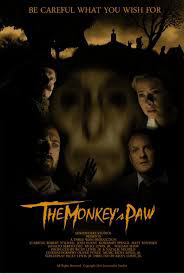William Wymark Jacobs, commonly known as W.W. Jacobs, was an English short story writer and novelist, born on September 8, 1863, in Wapping, London, and he died in 1943. He grew up near the docks of the River Thames, and this environment later influenced many of his stories, which often featured sailors, dock workers, and maritime life. Jacobs began his career as a clerk in the Post Office Savings Bank but soon turned to writing, publishing his first collection of short stories in the late 19th century.
Although many of his early works were humorous tales filled with wit and irony, Jacobs is best remembered for his contribution to horror fiction through his famous short story “The Monkey’s Paw” (1902). This story made him a celebrated name in English literature for its perfect blend of the ordinary and the supernatural. Jacobs’s writing style is marked by simplicity, realism, and suspenseful narration, often ending with a surprising or ironic twist. His works reflect themes of human greed, fate, and the unexpected consequences of desires. Through his unique storytelling, W.W. Jacobs secured his place as one of the finest short story writers of early twentieth-century English literature.
About Play “The Monkey’s Paw” is a famous short story written by W.W. Jacobs and first published in 1902 in his collection The Lady of the Barge. It is one of the most popular and chilling tales in English literature, combining elements of mystery, horror, and moral lessons. The story revolves around the White family—Mr. and Mrs. White and their son, Herbert—who come into possession of a magical monkey’s paw. The paw is said to grant three wishes to its owner, but each wish comes with terrible and unexpected consequences.
Despite warnings from their friend Sergeant-Major Morris, who brings the paw from India, the Whites make their first wish for money. The wish is fulfilled in a horrifying way when their son dies in a factory accident, and they receive compensation. Stricken by grief, Mrs. White wishes for Herbert to return, leading to a terrifying climax. In panic, Mr. White uses the final wish to undo the horror.
The story explores the themes of fate, greed, and the danger of tampering with destiny. Through suspense and irony, Jacobs teaches a powerful lesson: human beings should not interfere with the natural course of life.
THE MONKEY'S PAW ( MOVIE🎬 )
"Monkey's Paw" the play was written by
W.W. JACOB .in1902. It is a horrible and humorous play. The play was adapted for storage by L.N. Parker. After this play become a movie it was directed by
RICKEY LEWIS JR. In 2010.
W.W.JACOB
I am a student of M.R.R.Monpara Art College. There I am studying B.A.sem 3 main English. "Monkey's Paw" is included in our syllabus so our professor Kavisha Ma'am give us some questions. Those I am presenting here.
THE PAW
∆.What is the difference Can you identify comparing the play with the film?
Most of the play and movie's messages are the same although both have some differences.
1. BEGINNING
The play started with Herbart's home 🏠. But the movie started with Born of try .
2. ENVIRONMENT
The movie is very horrible better than the play. Ex. A dog was barking in the movie.
3. WISH
Mr White the wished £ 200 in the play but in the movie, he wished for £ 300.
4. JOB
Herbert went to a job at night in the play but in the movie, he went In the morning and the man who gave news of Hurburt's death came in the movie evening time and the play in the morning time.
5. ENDING
The play ends with Mr White's last wish but in the movie, Mr White was die.
∆. DID THE SHORT FILM INCREASE YOUR UNDERSTANDING OF THE PLAY? IF YES, HOW?
Yes, it is said that movies have the ability long time people do not forget better than reading because some of us forgot what we read but in a movie, we don't forget easily because of this sean, music and dialogue
∆.COMMENT ON THE ENDING OF THE FILM.
At the end of the movie, Mr White's wish was granted to his son to come back but when Mrs White opens the door before White was wished situation is normal. So Herbert went back Mrs White was crying. At last Mr.White also died. 
HERBERT COME BACK
Characters:
1. Mr. White
Head of the White family.
Curious and sometimes careless.
Makes the first wish on the monkey’s paw for money.
Regrets his decision after his son’s death.
2. Mrs. White
Loving and emotional mother.
Deeply attached to her son, Herbert.
Becomes desperate after his death and wishes for his return.
3. Herbert White
Cheerful and kind young man.
Jokes about the monkey’s paw.
Dies in an accident after the first wish is made.
4. Sergeant-Major Morris
A family friend and soldier.
Brings the monkey’s paw from India.
Warns the Whites about its dangerous magic.
THEMES:
1. Fate vs. Free Will – The story shows that humans should not try to change their fate.
2. Greed and Desire – The Whites’ wishes show how greed can lead to tragedy.
3. Consequences of Temptation – Every wish comes with a heavy price.
4. The Supernatural – The monkey’s paw represents mysterious and uncontrollable powers.
5. Love and Loss – The Whites’ love for Herbert leads them to make dangerous choices.










Comments
Post a Comment